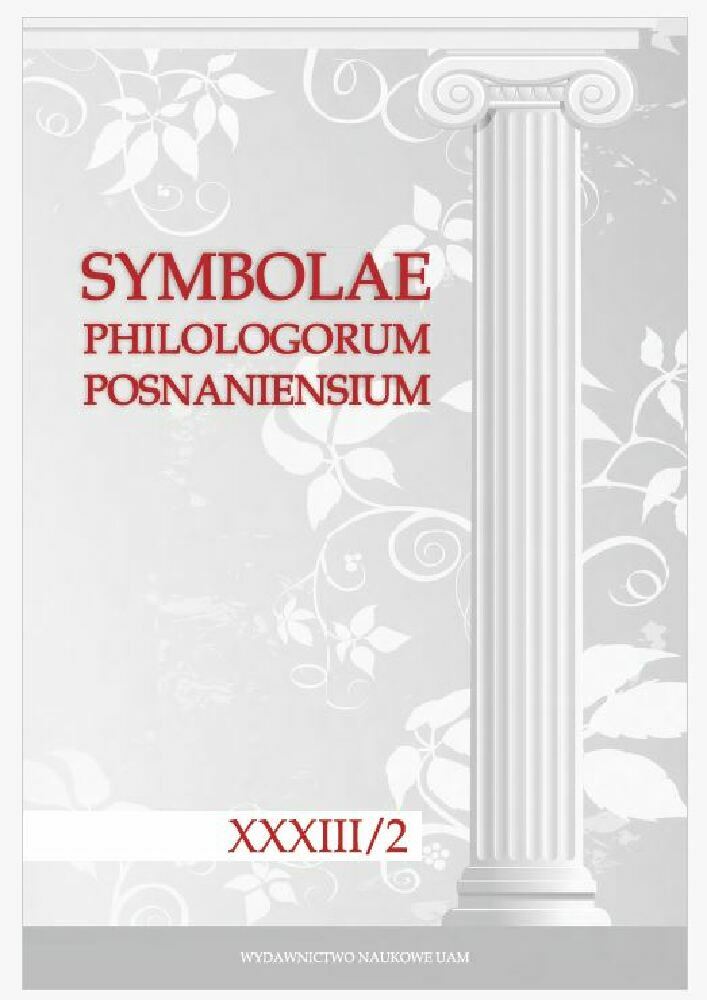Abstrakt
This study investigates some of the ways in which surveillance turns into transgression in Plautus’s plays. Watching over someone (obseruatio, in the general sense) can take the form of close watch, spying, and voyeurism, and we try to identify where the transgression lies. As Plautus uses Roman social patterns to turn them into a comical game, the investigation shows how the playwright intertwines social aspects with comical poetics. Our starting point is indeed the situation of the slave Sceledrus in the Miles gloriosus, for which some critics have spoken of “transgression”, as “he saw what he should not see”. However, his position is ambiguous insofar as he did indeed receive a surveillance mission. As we examine Plautus’s plays, it appears that secrecy, with the ignorance that goes hand in hand, is the discriminating element between watch and spying. The speculator, the spy, observes the actions of another character unbeknownst to him. Yet it is this espionage that often highlights the transgression of the spied-on character, who commits a reprehensible or forbidden act. It is the case of some senes in particular, with their vice and decadence. When pleasure occurs in the process, we can speak to a certain extent of voyeurism. The ignorance, the limit and the intention of the beholder are therefore at the heart of the question of transgression. In this sense there is transgression in the case of the guardian of the Miles gloriosus only because the neighbour wants to defeat the guardian by accusing him of spying on his home. It is the trick employed by the neighbour and his sidekicks that transforms the legitimate «guardian» into a «transgressor». The real transgressor is the guarded figure, the courtesan, as are some senes in other Plautus’s plays.
Bibliografia
Plaute. Comédies. vol. I-VII. Texte établi et traduit par A. Ernout. 1932–1940. Paris.
Plaute. Théâtre complet. vol. I-II. Édition et traduction de P. Grimal. 1991. Paris.
Arcellaschi 1992: Arcellaschi, A. 1992. «Lydus, paedagogus et servus dans les Bacchides de Plaute». Pallas: Revue d’Études Antiques 38: 327–336. DOI: https://doi.org/10.3406/palla.1992.1260
Arnott 1965: Arnott, W. 1965. «A note on the motive of ‘eavesdropping behind the door’ in comedy.» Rheinisches Museum für Philologie 108.4: 371–376.
Aygon 2000: Aygon, J.-P. 2000. «Les adverbes de lieu déictiques et les jeux avec l’espace dans le Miles Gloriosus de Plaute.» Pallas: Revue d’Études Antiques 54: 113–129.
Bungard 2020: Bungard, C. 2020. «Metatheater and improvisation in Plautus». In A Companion to Plautus. Ed. by G. Franko et D. Dutsch, 237–250. Hoboken. DOI: https://doi.org/10.1002/9781118958018.ch16
Casanova-Robin 2003: Casanova-Robin, H. 2003. Diane et Actéon. Éclats et reflets d’un mythe à la Renaissance et à l’âge baroque. Paris. DOI: https://doi.org/10.3917/enic.003.0083
Clark 1998: Clark, J. 1998. Looking at Lovemaking. Constructions of Sexuality in Roman Art, 100 B.C.-A.D. 250. Berkeley. DOI: https://doi.org/10.1525/9780520935860
Connors 2004: Connors, C. 2004. «Monkey Business: Imitation, Authenticity, and Identity from Pithekoussai to Plautus.» Classical Antiquity 3.2: 179–207. DOI: https://doi.org/10.1525/ca.2004.23.2.179
Dutsch, James, Konstan 2015: Dutsch, D., James, J., Konstan, D. 2015. Women in Roman Republican drama. Madison.
Ehrman 1997: Ehrman, R. 1997. «Glaucumam ob Oculos Obiciemus: Forbidden Sight in Miles Gloriosus.» Illinois Classical Studies 22: 75–85.
Fischer-Hansen, Poulsen 2009: Fischer-Hansen, T., Poulsen, B. 2009. From Artemis to Diana. The Goddess of Man and Beast. Copenhague.
Foucault 2012: Foucault, M. 2012. Préface à la transgression, suivi de Ceci n’est pas une préface: hommage à Georges Bataille / Michel Foucault de Francis Marmande, Fécamp [= Foucault, M. «Préface à la transgression», Critique 195–196, Hommage à Georges Bataille, Août-septembre 1963].
Frangoulidis 2018: Frangoulidis, S. 2018. «Aphrodisia and the Poenulus of Plautus: the case of Agorastoclès». In Life, love and death in Latin poetry. Studies in honor of T. Papanghelis. 207–219. Berlin. DOI: https://doi.org/10.1515/9783110596182-013
García Hernández 1976: García Hernández, B. 1976. El campo semántico de ver en la lengua latina: estudio estructural, Salamanca.
Gilhaus, Herrad 2020: Gilhaus, L., Herrad, I. 2020. Transgression und Devianz in der antiken Welt. Stuttgart. DOI: https://doi.org/10.1007/978-3-476-05508-8
Grezka 2009: Grezka, A. 2009. La polysémie des verbes de perception visuelle. Paris.
Hiatt 1946: Hiatt, V. E. 1946. Eavesdropping in Roman comedy. Chicago.
Itgenshorst, Le Doze 2017: Itgenshorst, T., Le Doze, P. La norme sous la République et le Haut-Empire romains. Bordeaux.
Konstan 1983: Konstan, D. 1983. Roman Comedy. Ithaca and London.
Manuwald 2011: Manuwald, G. 2011: Roman Republican Theatre. Cambridge. DOI: https://doi.org/10.1017/CBO9780511920868
Misdolea 2018: Misdolea, A. 2018: «Dies peruorsus». Vision et visible dans le théâtre de Plaute. Enjeux dramatiques, médicaux et philosophiques, dir. Carlos Lévy, Sorbonne-Université, Paris.
Moore 1998: Moore, T. 1998. The Theater of Plautus. Playing to the Audience. Austin.
Moreau 1997: Moreau, A. 1997. «Pour une apologie de la transgression ? Esquisse d’une typologie.» Kernos Revue internationale et pluridisciplinaire de religion grecque antique 10: 97–110. DOI: https://doi.org/10.4000/kernos.650
Pearce 1974: Pearce, T. 1974. «The role of the wife as custos in ancient Rome.» Eranos: Acta Philologica Suecana 72: 17–33.
Petrone 1989: Petrone, G. 1989. «La funzione dei nomi dei personaggi nella commedia plautina e nella tragedia senecana». In Scena e spettacolo nell’antichità. Atti del Convegno internazionale di studio, Trento, 28–30 marzo 1988. Ed. by L. De Finis. 233–252. Firenze.
Schottlaender 1973: Schottlaender, R. 1973. «Die komische Figur des Pädagogen bei Plautus». Das Altertum XIX: 233–240.
Sheldon 2009: Sheldon, R. 2009. Renseignement et espionnage dans la Rome antique (trad. A. Hasnaoui). Paris.
Slater 1985: Slater, N. 1985. Plautus in Performance: the Theater of the Mind. Princeton.
Stanford 1958: Stanford, W. 1958. Aristophanes. Frogs. London.
Stürner 2020: Stürner, F. 2020. «The Servus callidus in charge; plays of deception» In A Companion to Plautus. Ed. by G. Franko et D. Dutsch, 135–149. Hoboken. DOI: https://doi.org/10.1002/9781118958018.ch9
Traill 2001: Traill, A. 2001. «Knocking on Knemon’s Door: Stagecraft and Symbolism in the ‘Dyskolos’.» Transactions of the American Philological Association 131: 87–108. DOI: https://doi.org/10.1353/apa.2001.0019
Willms 2014: Willms, L. 2014. Transgression, Tragik und Metatheater: Versuch einer Neuinterpretation des antiken Dramas. Tübingen.
Licencja
Prawa autorskie (c) 2023 Ana Misdolea

Utwór dostępny jest na licencji Creative Commons Uznanie autorstwa 4.0 Międzynarodowe.

